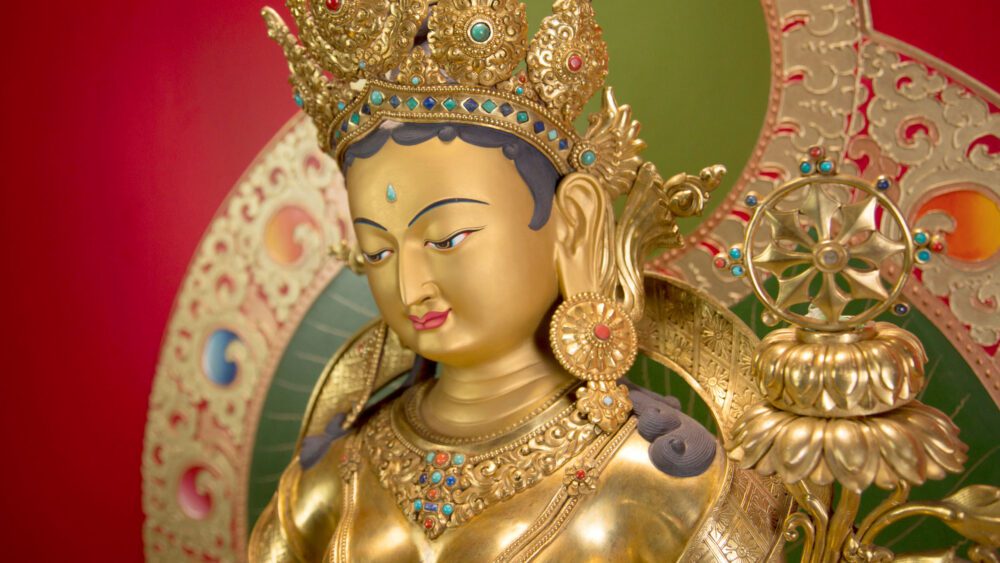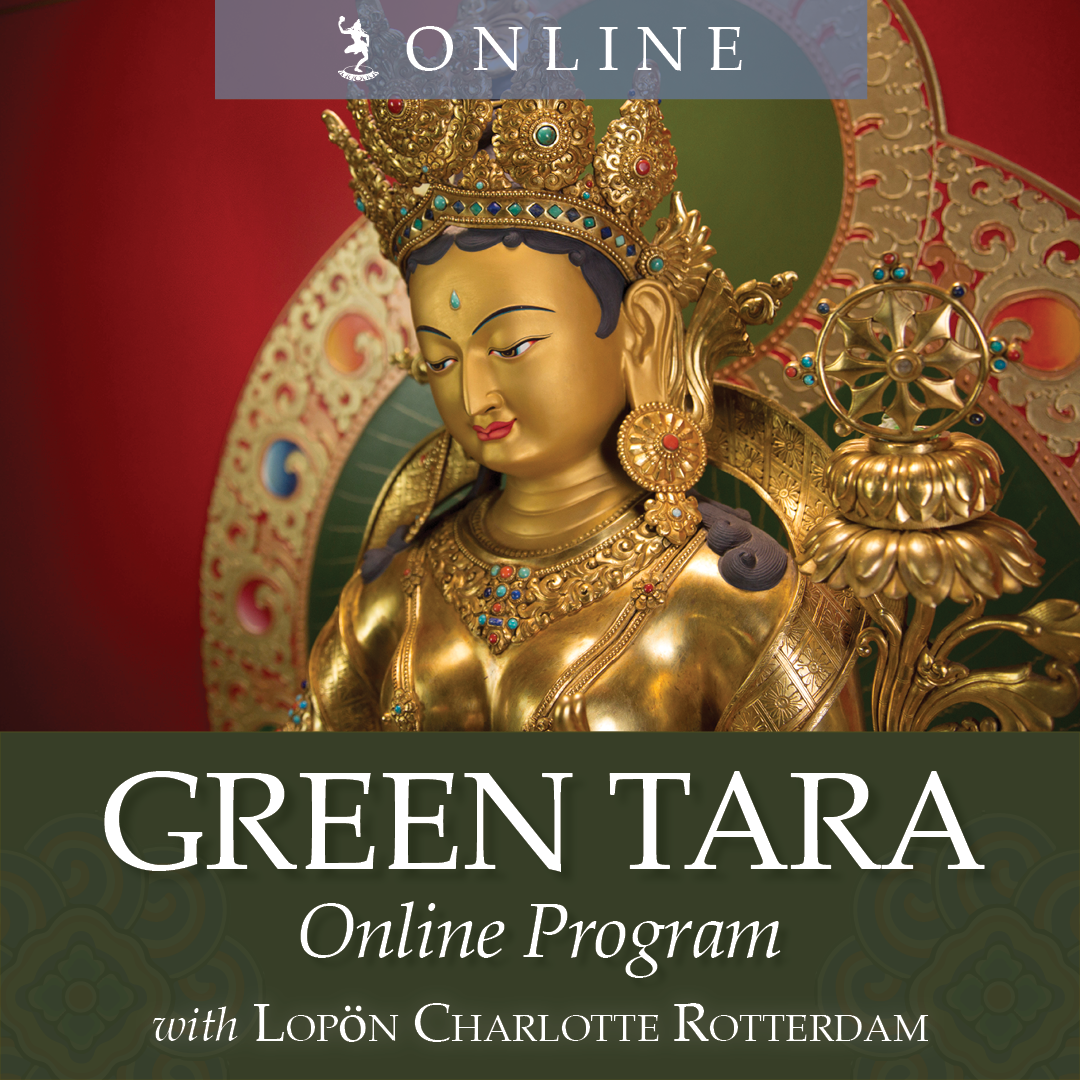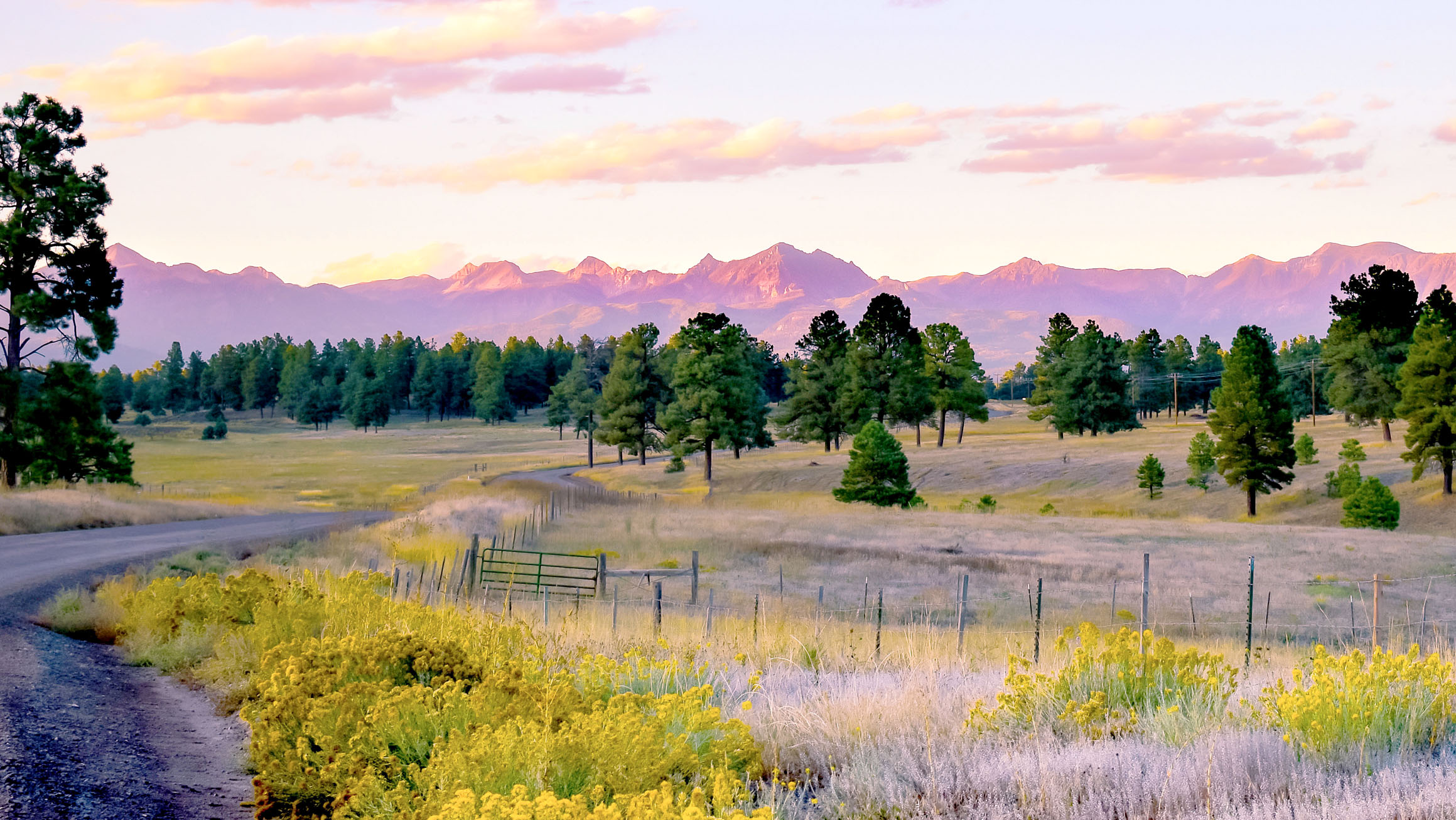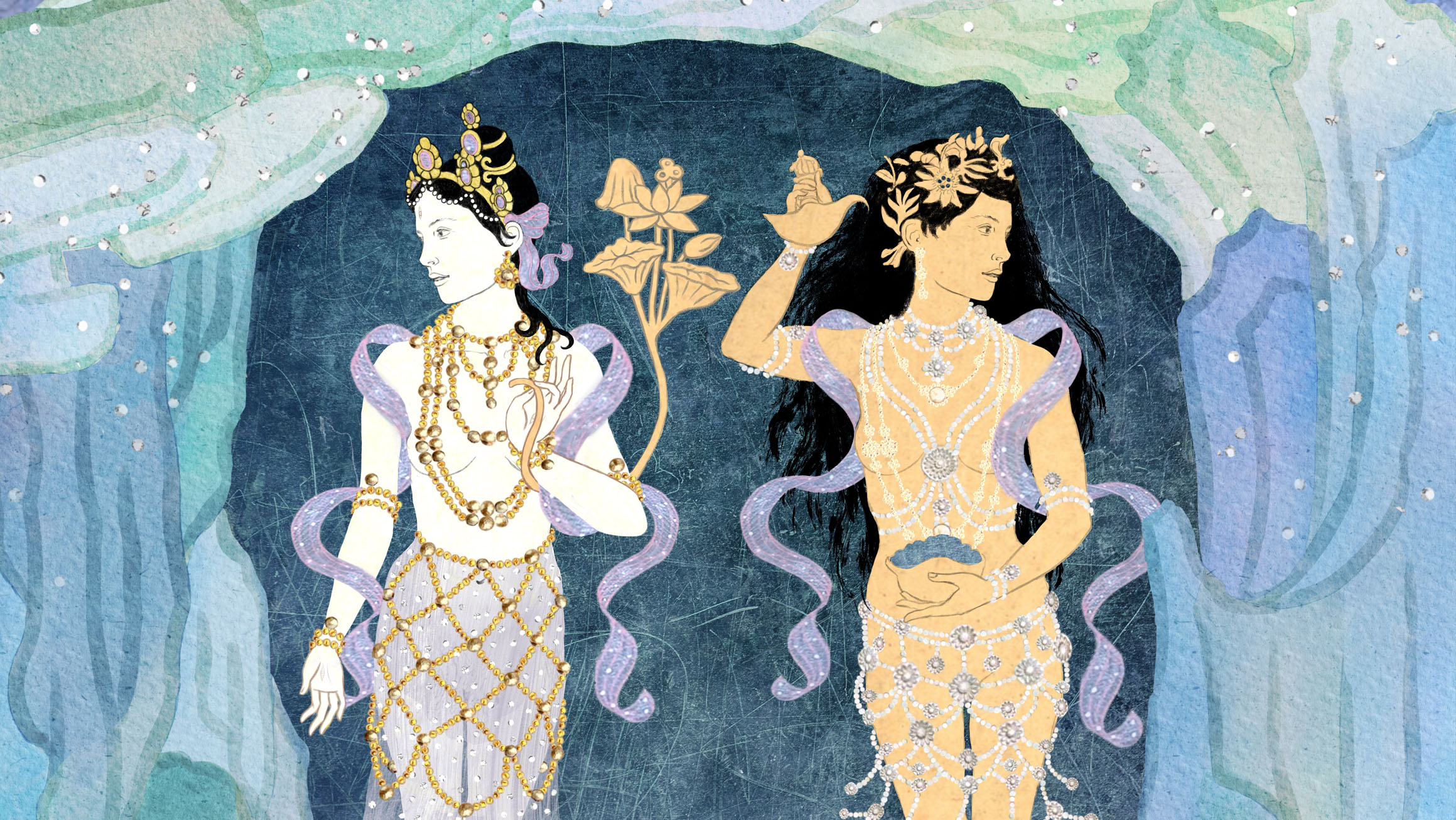“We are calling on the awakened heart which can be a mirror for the awakening of all hearts.”
~ Magyu Dorje Lopön Charlotte Rotterdam
In this blog post, Dorje Lopön Charlotte talks about how Vajra Pride is different from ordinary pride. Lama Tsultrim has spoken about how this can be experienced as “primordial self-esteem.” This is a powerful quality that we develop in the practice of “deity yoga.”
Dorje Lopön Charlotte will be leading the 4-day Green Tara virtual retreat on October 19-22. This is a great opportunity for beginners to learn about visualizing oneself as a deity, a fundamental meditation in Tibetan Buddhism (known as “deity yoga”), enabling one to step into primordial self-esteem. To learn more and to register, click here »
I’ve always thought of Pride as one of the Seven Deadly Sins, right up there with Lust, Gluttony and Avarice. In the Buddhist tradition, pride is one of the five poisons, accompanied by a similar entourage of desire, jealousy, anger and ignorance. Pride, of course, evokes the image of a puffed-out chest, an overly confident bully who is concerned only with their own recognition, often at the expense of the well-being of others.
In Vajrayana deity practices, however, developing Vajra Pride is a critical component of the practice. I’ve been intrigued by how Vajra Pride might be different from our ordinary sense of pride, and why it is considered so important.
Ordinary pride is self-importance, a fixation on proving one’s status or value; there’s little or no room for the care of others, no space for humor or a lightness of heart. Ultimately, this kind of pride is based on a sense of lack, an anxiety regarding one’s own worth. We are generally distrustful of pride because we feel the vacuum of insecurity that lies underneath. This pride is unstable; like the emperor of the fairy tale, we suspect that beneath all the hype there’s just a naked old man.
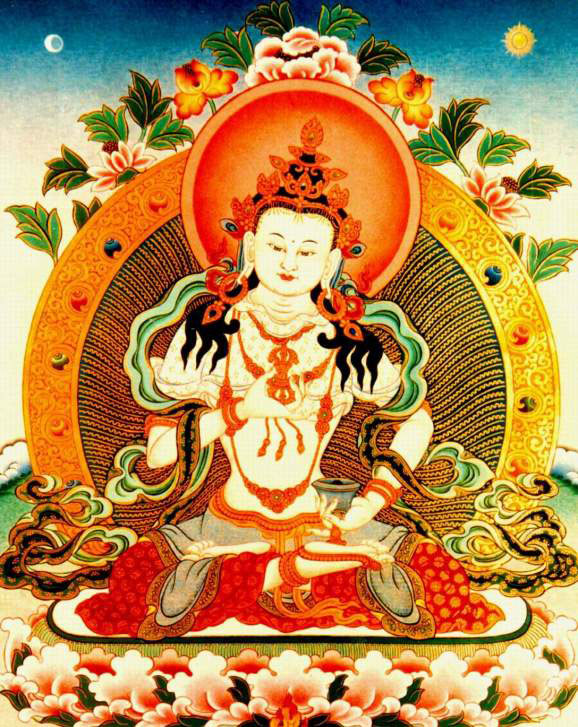
Vajra Pride, in contrast, has nothing to prove but is based on trust in one’s inherent worth and value. Lama Tsultrim describes it as “primordial self-esteem.” It’s based on knowing our true nature – Buddha Nature – and having the confidence to act from this recognition.
Looking at a photo from the Civil Rights movement, I sense this primordial self-esteem mirrored in the faces of the young black men who sat at the whites-only diner counter. There is no aggression in their faces, only a self-assured and courageous presence in the awareness of their inherent right as human beings. There’s a quality of radiance that emanates from total, unflinching self-esteem that is deeply inspiring.
We can catch glimpses of healthy self-esteem in our daily lives, watching a dancer effortlessly glide through the air, listening to a musician take us into the delights of an improvised riff. We hope that the EMT and the surgeon will have this type of confidence unhampered by self-doubt or hesitation.
When we raise bodhicitta before our practice, aspiring to benefit all beings, we are invoking this primordial self-esteem. The bodhisattva does not vow to benefit their ten closest friends; they vow to benefit all beings, a completely irrational and wildly idealistic aspiration by any normal standards. We’re not calling on the half-hearted bodhisattva within us; this is not the time for false modesty. We are calling on the awakened heart which can be a mirror for the awakening of all hearts.
We’ve all experienced low self-esteem and the suffering of hesitation it engenders. Continuously monitoring whether or not we are getting approval (from the outer or inner critic), our thoughts and actions are awkward, misaligned, clumsy and ineffective. We’re driving with the brakes on.
When we relax the tension of trying to prove ourselves, we actually create the space for natural Vajra Pride to arise. Trungpa Rinpoche suggests that whereas “confused ego pride…is trying to become something else,” Vajra Pride is “facing the reality of one’s nature…being willing to be what one is.” There is, of course, incredible courage in this. We stand tall in our lives with basic confidence, simple clarity, and grounded fearlessness. Being of benefit – however that looks in our specific chapter of life – is not a chore but an inspired, joyful call, an expression of our awakened heart.
The key to Vajra Pride is its vajra-like nature: unfabricated, indestructible, primordial. This self-esteem is not built on a list of accomplishments; it’s not backed up by an illustrious CV. As Trungpa reminds us, “there is no need for compliments or acknowledgement…the question of poverty and richness has never been raised.” Vajra Pride is not built on our successes or broken by our failures. For a culture built on success and failure as the measure of our lives, the invitation of Vajra Pride is quite profound.
How, then, might we cultivate Vajra Pride?
• Deity practice: All Vajrayana deity practices involve visualization of ourselves as the deity; we visualize the details clearly, reflect on their symbolism, and invoke Vajra Pride, the “pride of the deity.” We really come to feel ourselves as the deity, embodying both the wisdom of interdependent emptiness and the skillful means of compassion. These practices are wonderful opportunities to try on the costume of Vajra Pride; their underlying purpose is to train us to move into our daily lives as the deity with the same inner, unshakable confidence, wisdom and compassion.
• Feeding your Demons: When self-doubt arises, we can recognize these as demons, not different from the maras that arose at key crossroads in the Buddha’s life. Feeding your demons can be a helpful way to work gently with these demons of insecurity, anxiety, fear and the various manifestations that our lack of inherent self-worth generates.
• Rest: Since Vajra Pride is primordial, it is perhaps best accessed not by straining more but by gently leaning back, relaxing more. We might contemplate who we are if we let all our accomplishments fall away. What remains when we drop all we have built up to prove our self-worth? The invitation to “just rest” counters our normal tendency to try harder, push further, do more. Rather than amping up our quest for confidence outside ourselves, we turn the searchlight inwards. Referring to our innermost wisdom, our true nature, the 9th century Indian teacher Aryadeva the Brahmin reminds us that “the meaning of the Prajna Paramita is not to be looked for elsewhere; it exists within yourself.” That means right now, just as you are, in this very moment without any manipulation. In that gentle and full presence we can experience the light of Vajra Pride shining brightly.
Green Tara
With Magyu Dorje Lopön Charlotte Rotterdam • October 19 – 22
This retreat will be a great opportunity for new and old students alike to deepen their understanding and knowledge of the Green Tara practice. You will receive the transmission (Tib. Lung) of this practice and learn how to perform deity visualization, mantra recitation, mudras, musical offering and feast offering. There will also be opportunity to engage in group practice, and ask questions … Read more »
This blog post is republished here with permission from Lopön Charlotte Rotterdam, via her Skymind website. Header: Photo of the Green Tara statue in the Tara Mandala Temple (photo by Alan Kozlowski)

